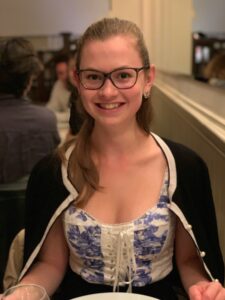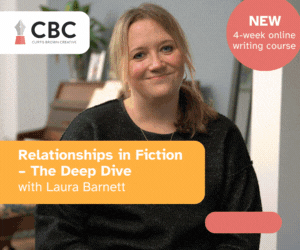Ask An Industry Expert: Hannah Schofield
23 April 2021
Today I’m delighted to welcome Hannah Schofield, Junior Agent with LBA Books.
 Hello and welcome, Hannah. Perhaps you could begin by introducing yourself and telling us something of your career path into your current role?
Hello and welcome, Hannah. Perhaps you could begin by introducing yourself and telling us something of your career path into your current role?
Hi there! Thank you so much for having me. I’ve been working in publishing since 2016, when I started interning for an agent, and had stints as a translation rights assistant and at a literary scout’s before landing at LBA in 2018. I worked on my colleagues’ lists, and since last year have been taking on my own clients too – I actually sold my first book at auction during lockdown! I’m now building my own list of commercial and reading-group fiction at LBA.
An auction! That sounds so exciting. How does that work?
Yes, it was thrilling for me and the author to have the first book I ever submitted get such a great response from editors. A book will be sent on submission to a number of editors that the agent thinks will be a good fit. If more than one of them wants to buy it, an auction will happen! Each agent handles these slightly differently, but the publishers are invited to bid competitively (usually by increasing the advance and/or improving the royalty terms, but also pitching their marketing and editorial plans) until one emerges victorious and signs up the author. It’s very nerve-wracking and exciting for all involved!
And could you tell us how you decide what is ‘commercial’ and what isn’t?
Great question – there are a lot of thoughts on the commercial versus literary divide. This is not quite the whole truth though…! For me, I love commercial fiction and having fun when reading. I feel like some checkpoints that are useful for determining whether a novel is commercial or not include: does it have a strong, one-line pitch? Is the narrative plot-led, and do dynamic characters drive the action? Does the narrative follow or riff off the established tropes of the genre it’s in? Does it have a satisfying ending (HEA or otherwise)? If the answer to these questions is ‘yes’, I’d probably class it as a commercial book – and it would definitely be one I want to read!
A useful check list for us authors! On commercial viability, I’m sure loads of authors out there would love to be nominated by the Richard and Judy Club. How does a title become a ‘reading group’ book?
I love the Richard and Judy Book Club picks and others like it – I often scour them for my own TBR piles. I think ‘reading group’ as a definition though means that the themes of the novel need to start a conversation so you could have a proper discussion about it at a book club – for example, adoption and surrogacy in Little Fires Everywhere by Celeste Ng; teenage pregnancy and a love triangle in Brit Bennett’s The Mothers; or the fallout of false incarceration in An American Marriage by Tayari Jones (all favourites of mine!). And perhaps there’s not a clear genre distinction (thriller, romance, historical) and it might straddle several.
LBA Books deals with a range of literary genres. In the current tension of the pandemic, is it easier to place, say, a thriller about combatting a world plague, or a feel-good HEA romance? In other words, do you think these strange times are affecting reader, hence publishing, choices?
It seems to be depending on the reader! Some are gravitating to darker themes (“at least our pandemic lives aren’t this bad!”), and some – myself included – are leaning towards uplifting, escapist themes. At the moment, I personally couldn’t bear to read a book about a world plague! And I’ve been hearing from several editors that they’re looking to acquire something really feel-good – we all need a bit of comfort reading at the moment, I think.
Which leads neatly onto my next questions. How important is Romance for your company and for you personally in the authors on your list?
We have had huge success at LBA with romance – and my esteemed colleague Amanda Preston was the RNA Literary Agent of the Year in 2018 – so it’s very much at the heart of what we do at the agency. For me, I am a complete romantic and am always keen to read in this genre. On my list, as well as Charlotte Butterfield and Jenni Keer, whose novels are deliciously swoony (while also dealing with more serious topics), I’ve just sent out the most gorgeous UK-set romcom – hopefully more on that soon!
Sounds promising! I note that the Agency is currently open for submissions and those submitting fiction must send a covering letter, brief synopsis and first three chapters. Any advice on how to produce a gripping synopsis, how to make yourself stand out from the rest and what the opening page of the m/s needs to demonstrate to make you want to turn the page?
Submissions that immediately catch my eye tend to have a very clear pitch and great comparison titles. Bonus marks if your title is also really compelling. As for the rest of the submission – I personally don’t read the synopsis until after I’ve read the pages, and what I’m looking for there is a sense that this author understands the story structure in the genre they’re writing in, including spoilers.
I also know in the first few pages of a manuscript whether this might be something for me, and this response is harder to quantify. At its core, I’m looking for a character and plot to grip me – and if you have a brilliant voice or an explosive start, that’s going to make me want to continue reading!
Do you look for anything in an author apart from a brilliant book? (such as social media presence)
Nope! But once I’ve got to the stage of wanting to offer representation, I also ask authors about what they’re planning to write next, to make sure I’d be a good fit for them over several projects.
Diversity and inclusion are high on the agenda for the RNA, as for many other organisations. I wonder how the Agency’s selection of books and authors reflects these principles?
I think that it’s great that there are more of these conversations happening and there is more awareness and transparency around whose voices we as an industry are promoting, but having conversations is only the starting point. As for me, I am actively seeking to have a roster of authors that reflects the actual world we live in, not just my experience of it. I particularly welcome submissions from writers of colour, writers from the LGBTQ+ community, disabled and neurodivergent writers, and writers from different socioeconomic backgrounds – whether they are writing novels that specifically reference their identities or not. And this is across all genres. I’d also love to see rom-coms, a brilliant historical, or a gripping thriller by writers from these communities.
What do you yourself read for leisure (assuming you get any!) and can you tell us the last published book you read which you really enjoyed and why?
I devoured Last Tang Standing by Lauren Ho – which is both a hilarious portrait of one woman’s quest to ‘have it all’ as well as a brilliant hate-to-love romance. It also features a cameo in Luxembourg – where I grew up! As soon as I’d finished, I bought another copy for my sister.
Given your international background, have you any views on the factors that make a novel suitable for translation for the overseas market, and correspondingly those that just don’t work?
I do consider translation potential for the projects I work on for sure, and the suitability of a novel for translation tends to vary for each overseas territory: for example, WWII novels are not easy to place in Germany, but other countries love them. But a strong hook, characterisation, and plot will always win you fans whether at home or abroad!
What is your typical working day like?
This is a tricky question to answer, as my job is extremely varied—one of the things I most love about my role. Like for so many, the day-to-day has shifted during the pandemic. But it will involve some combination of: reading and editing manuscripts; Zooming with editors, scouts, and authors; reading submissions; processing contracts; keeping our financial files up-to-date and making sure authors are getting paid on time; posting author news on Twitter; and answering my many, many emails! On particularly fun weeks it will also involve sending out an exciting project to editors – and then madly crossing my fingers!
What’s the best/worst part of your job/ the funniest/most embarrassing thing that’s happened at work? (ie something anecdotal about you in the work)
I’d obviously prepared for my job at LBA by reading a lot of their clients’ books, and one that had stolen my heart was The Girl Before You by Nicola Rayner. Nicola called the agency one early day in my tenure and instead of saying, very professionally, “Oh of course, Nicola, I’ll transfer you immediately”, I gushed, “Ohmygoodness I love your book so much” and then instantly put her through. Couldn’t help a little fangirl moment!
The best part of my job is still getting to gush about all our clients’ brilliant books and be part of their journeys into the world!
Thank you so much for finding time in your busy schedule to talk with us, Hannah.
For more on Hannah and LBA Books see:
Website link: https://lbabooks.com/agents/hannah-schofield
Twitter: https://twitter.com/LBA_Agency and https://twitter.com/hannschofield
*
Hannah was talking with Susan Leona Fisher (website: www.slfisherauthor.co.uk)




